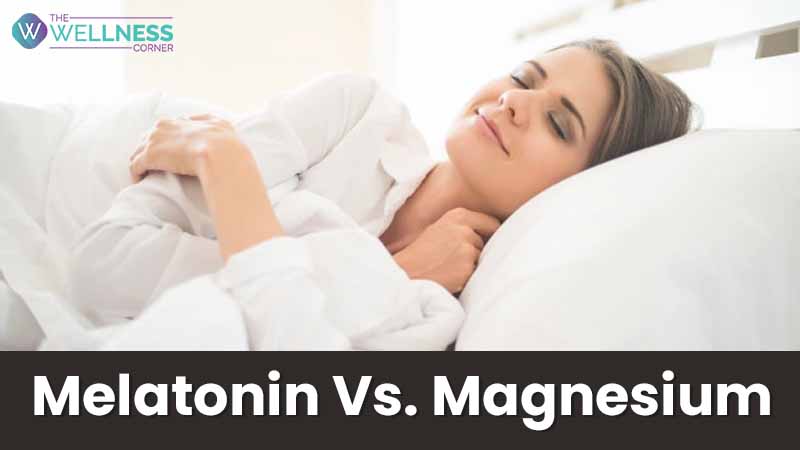Melatonin Vs. Magnesium: What’s The Difference and Which One Is Better?
- 49 months ago
How awkward does it get when your boss finds you yawning at your desk, or imagine the frustration of tossing and turning on the bed till wee hours! Are you one of them? Unfortunately, sleep deprivation can happen to anyone like a shift worker, new parents, people with insomnia, frequent travelers across different time zones, and others.
If you have been searching for a supplement for sleep, there are high chances that you may have come across two names- magnesium and melatonin.
But which one to choose? Let us find out.
Melatonin Vs. Magnesium: Which One is a Better Sleep-Aid Strategy?
Both magnesium and melatonin are interrelated. People bank on them expecting the same outcome, which is a good night’s sleep. However, both deploy separate mechanisms to do it.
Let us first understand the differences between these sleep supplements:
● Magnesium is a mineral, which our body gets from magnesium-rich foods like nuts, fruits, whole grains, dark leafy greens, and dairy products. Melatonin is an antioxidant and a hormone that the pineal gland in our body produces naturally.
● Melatonin supplements help to regulate your sleep cycle. Magnesium boosts melatonin production, which aids you in sleeping better. Also, it activates the parasympathetic nervous system that is in charge of calming and relaxing you.
● If you choose melatonin for sleep, you must know that it sets off the stage of sleepiness. So, you must take it about 90 minutes to two hours before your usual bedtime. It gives the supplement sufficient time to blend into your bloodstream and start working. Magnesium, on the other hand, increases your sleep efficiency and rest time (study).
● Your biological clocks manage your physical, mental, and behavioral changes in the 24-hour cycle. Magnesium plays a vital role in ensuring that your biological clocks are ticking well, whereas melatonin controls your sleep-wake circadian rhythm.
● Magnesium controls a neurotransmitter called GABA. It decreases the communication between your nervous system and brain, calms you, and helps you stay asleep. Melatonin kicks start sleepiness but may not ensure a relaxing sleep.
● When it comes to your nervous system, research says that melatonin can effectively protect your central nervous system from neurological problems. Magnesium is crucial as it monitors the cells responsible for thinking, moving, and functioning.
So, Magnesium and Melatonin are they Both Safe?
There is nothing to worry about if your intake stays within the prescribed boundaries.
If you consider melatonin for sleep, the most common side effects that you may experience include:
- Diarrhea
- Nausea
- Drowsiness
- Sleepiness during daytime
- Stomach cramps
If you go beyond the recommended threshold, melatonin can make sleeping harder, disrupt your sleep-wake cycle, give you nightmares, joint pain, and anxiety.
In the case of magnesium, a few side-effects can be:
- Diarrhea
- Cramping
- Nausea
If you pick magnesium for sleep, remember that large doses can lead to magnesium toxicity resulting in low blood pressure, impaired kidney function, irregular heartbeat, or even a heart attack.
Additionally, if you are pregnant, breastfeeding, have bleeding disorders, or taking medications for any health condition, it is optimum to consult your physician before introducing a sleep supplement into your routine.
What Can You Do to Sleep Naturally?
Indeed, sleeplessness can be tremendously frustrating, but there are numerous things that you can do to sleep better naturally.
A quick guide:
- Keep aside all electronic gadgets
- Limit alcohol and caffeine intake
- Do not eat late in the evening
- Avoid lengthy daytime naps
- Do not go to sleep too stuffed or starved
- Take a relaxing shower
- Get the right mattress and pillow
- Exercise regularly
- Maintain a healthy and wholesome diet
The Bottom Line
Falling asleep feels so easy after that cumbersome day, and ideally, it should be easy. Your body is well-appointed with all the tools, which you need for a pacifying sleep at night.
But for some people getting quality sleep is not that simple. Occasionally, your sleep cycle calls for some calibration. So, if you want to take the supplement route, the first step is to understand the root cause of your sleeplessness. Then, choose the right supplement, sleep better, and wake up feeling rejuvenated.
Writer’s POV
The increasing popularity and interest in magnesium and melatonin as sleep supplements is understandable considering the amount of stress and overscheduling we handle. However, while both can help you get quality sleep, you must consider them temporary remedies as their intake for a long time could result in dependency. So, if your sleeplessness worsens, seeking medical consultation is the best.








